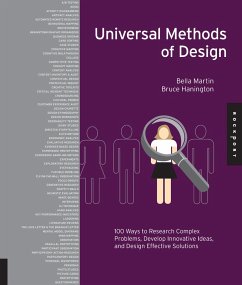This comprehensive reference provides a thorough and critical presentation of 100 research methods, synthesis/analysis techniques, and research deliverables for human centered design, delivered in a concise and accessible format perfect for designers, educators, and students.
Universal Methods of Design serves as an invaluable compendium of methods that can be easily referenced and used by cross-disciplinary teams in nearly any design project.
Methods and techniques are organized alphabetically for ongoing, quick reference. Each method is presented in a two-page format. The left-hand page contains a concise description of the method, accompanied by references for further reading. On the right-hand page, images and cases studies for each method are presented visually. The relevant phases for design application are highlighted as numbered icons along the right side of the page, from phases 1 (planning) through 5 (launch and monitor).
Build more meaningful products with these methods and more: A/B Testing, Affinity Diagramming, Behavioral Mapping, Bodystorming, Contextual Design, Critical Incident Technique, Directed Storytelling, Flexible Modeling, Image Boards, Graffiti Walls, Heuristic Evaluation, Parallel Prototyping, Simulation Exercises, Touchstone Tours, and Weighted Matrix.
This essential guide:
- Dismantles the myth that user research methods are complicated, expensive, and time-consuming
- Creates a shared meaning for cross-disciplinary design teams
- Illustrates methods with compelling visualizations and case studies
- Characterizes each method at a glance
- Indicates when methods are best employed to help prioritize appropriate design research strategies
Universal Methods of Design is an essential resource for designers of all levels and specializations.
Dieser Download kann aus rechtlichen Gründen nur mit Rechnungsadresse in A, D ausgeliefert werden.


